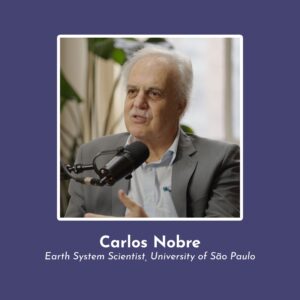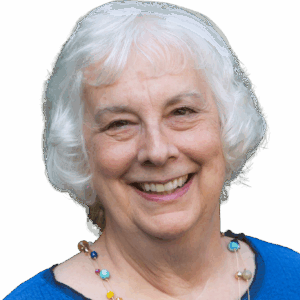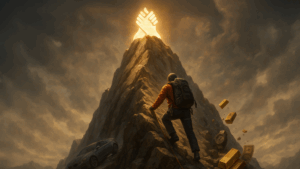
Ep 150 | Carlos Nobre
Carlos Nobre: “Carbon Sink to Carbon Source? How the Amazon Rainforest Could Become a Self-Drying Savanna”
Show Summary
The Amazon Rainforest is one of the Earth’s most vital systems, playing a key role in maintaining the balance and stability of our climate. Yet this extraordinary ecosystem, which influences global rainfall patterns and regulates temperatures, is increasingly threatened by human activity. What is the current status of the ancient Amazon Rainforest, and how could its trajectory shape the entire planet for thousands of years to come?
In today’s episode, Nate speaks with Earth scientist Carlos Nobre to explore the critical challenges facing the Amazon. They delve into the rainforest’s unique ecological dynamics, the devastating impact of deforestation and wildfires on its ability to function, and how the health of the Amazon directly influences the climate of the entire world.
In what ways does the astounding biodiversity of the Amazon play critical roles in its resilience, and how is that biodiversity being put at risk? How could a system that has sustained its own water cycles for millions of years suddenly tip into a self-drying savanna? Finally, what actions should countries – beyond the Amazonia region itself – take to support the conservation and restoration of the world’s largest rainforest and the people that call it home?
About Carlos Nobre
Carlos A. Nobre is an Earth Scientist from Brazil, currently associated with the University of São Paulo. He is also the co-chair of the Science Panel for the Amazon-SPA. He obtained his PhD in Meteorology at MIT. Nobre’s work mostly focuses on the Amazon and its impact on the Earth System. He chaired the Large-Scale Biosphere-Atmosphere Experiment in Amazonia (LBA). He is a foreign member of the US National Academy of Sciences and the Royal Society, and member of the Brazilian Academy of Sciences and the World Academy of Sciences. He was awarded several prizes including the Volvo Environmental Prize, the AAAS Science Diplomacy Award and AAAS Fellow Award. He also developed the Amazonia 4.0 initiative, an innovative project to demonstrate the feasibility of a new socio-bioeconomy of standing forests and flowing rivers in the Amazon.
In French, we have a motto that says that a simple drawing is often better than a long explanation. Jean-Marc Jancovici Carbone 4 President
That’s very understandable because with left atmosphere thinking, one of the problems is that you see everything as a series of problems that must have solutions. Iain McGilchrist Neuroscientist and Philosopher
We can’t have hundreds and hundreds of real relationships that are healthy because that requires time and effort and full attention and awareness of being in real relationship and conversation with the other human. Nate Hagens Director of ISEOF
This is the crux of the whole problem. Individual parts of nature are more valuable than the biocomplexity of nature. Thomas Crowther Founder Restor
Show Notes & Links to Learn More
00:00 – Carlos Nobre info + works, Science Panel for the Amazon, Large-Scale Biosphere-Atmosphere Experiment, Amazonia 4.0
03:04 – National Institute of Amazonian Research
03:15 – 0.5% of the Amazon had been deforested in 1975 + more info on deforestation in the Amazon
06:46 – Evolution of the Amazon + more info
07:10 – Water recycling in the Amazon + more info
07:43 – Annual rainfall in the Amazon
08:19 – Rainforest transpiration during wet vs dry season + more info
12:15 – 150-200 billion tons of carbon stored in the Amazon + carbon cycle in the Amazon
14:27 – Impact of Amazon deforestation on rainfall, impact on global climactic events, impact on US climate
16:14 – *92% of sunlight is absorbed by the rainforest canopy
17:57 – Wildfires and drought in the Amazon
18:28 – Climate change and droughts in the Amazon
19:16 – Previous droughts + 2023/24 drought
19:45 – El Niño phenomenon + intensities
20:00 – El Niño and drought in the Amazon
20:45 – Amazon deforestation and climate change 1990 paper + 1991 paper
21:00 – Amazon deforestation figures
22:02 – 1990 IPCC report
22:50 – 2016 paper on tipping points in the Amazon
23:00 – Today 18% of the Amazon has been deforested
23:11 – We reached 1.5 degrees warming in 2023
23:32 – Increasing dry season length in the Amazon
24:05 – Forests’ role as carbon sinks
24:15 – The Amazon’s role as a carbon sink + more info
24:23 – The Amazon has become a carbon source
25:00 – 2024 paper: Critical transitions in the Amazon forest system
25:15 – Amazon forest degradation
27:58 – Amazon deforestation halved in 2023
28:35 – Amazon summit Belém
31:05 – August 2024 temperature record
32:10 – Current climate policies will lead to 2.5 degrees warming
33:02 – Military dictatorship in Brazil + Colonialism, dictatorship and deforestation
34:40 – Fires caused by criminal activity + 90% of deforestation is illegal
35:50 – Satellite monitoring of deforestation in Brazil
36:55 – ‘Arcs of Restoration’ policy brief
38:36 – The cost of saving tropical forests
40:30 – Biodiversity in the Amazon: 16,000 tree species + 50,000 plant species
41:30 – Oropouche virus
42:03 – Pandemic risks from the Amazon
42:50 – The Amazon River
44:05 – Planetary tipping points + more info
44:10 – Johan Rockström + TGS Episode
44:20 – Permafrost collapse and carbon release
45:25 – 6th Mass Extinction + Has the Earth’s 6th Mass Extinction already arrived?
45:50 – Atmospheric CO2
46:15 – Corey Bradshaw + TGS Episode, impact of warming on extinctions
47:08 – Secondary forests + carbon sink potential of secondary forests in Brazilian Amazon
49:05 – Regenerative Agriculture
51:04 – The Amazon’s ‘flying rivers’
51:20 – Economics of Amazon reforestation
51:40 – Law preventing products causing deforestation from being sold in EU
52:49 – Profitability of agroforestry + more info
53:11 – Growth in global beef consumption
54:03 – IPCC on cutting out meat
55:40 – Environmental impact of beef consumption
56:57 – 65% of deforestation caused by cattle ranches
58:06 – Afro-descendent presence in the Amazon
59:20 – Peoples of the Amazon before european colonization
1:00:00 – Indigenous population in Brazil over time
1:00:10 – The Amazon is home to *1.5 million indigenous people
1:01:15 – Sonia Guajajara
1:01:30 – Brazil’s congress pushing against indigenous land rights + more info
1:03:16 – Amazon Creative Labs: Cupuacu-Cacau
1:05:57 – Amazon Institute of Technology + more info
1:08:15 – Planetary Guardians + Planetary Boundaries







